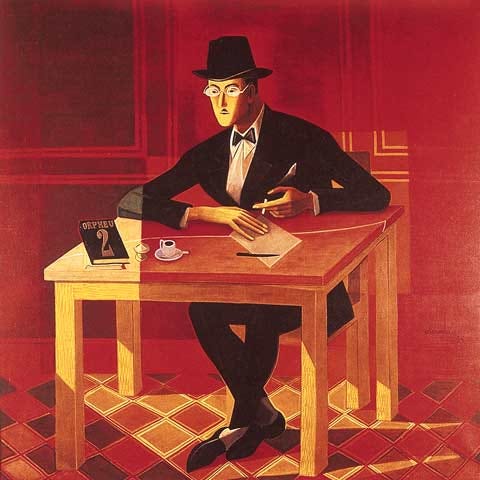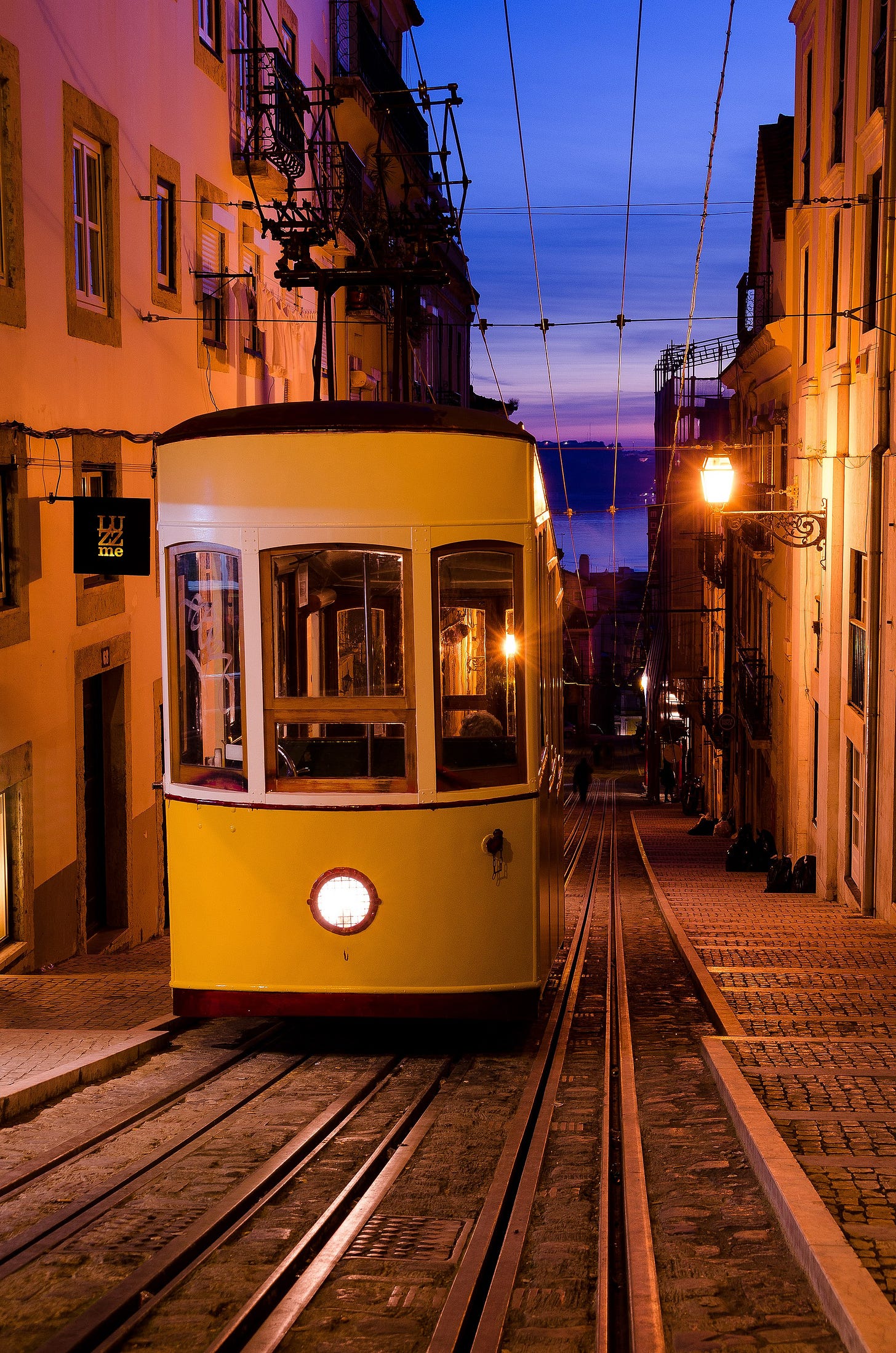“Life is an experimental journey undertaken involuntarily. It is a journey of the spirit through the material world and, since it is the spirit that travels, it is the spirit that is experienced. That is why there exist contemplative souls who have lived more intensely, more widely, more tumultuously than others who have lived their lives purely externally.” — Fernando Pessoa, The Book of Disquiet

A soothing sea breeze wafts up from the Tagus, somehow traversing the sweltering rays of sun bombarding the Praça do Comércio, and thus slightly refreshing our table on the sultry terrace of the Café Martinho da Arcada. There we sit intently scribbling ruminations in our Moleskine notebooks, a chilled bottle of albariño and a delectable plate of marinated octopus salad within arm’s reach. Had the self-proclaimed flâneur, Fernando Pessoa, once sat at this very table with his alter egos Alberto Caeiro, Álvaro de Campos, Ricardo Reis and Bernardo Soares, penning their own disquieting reflections on existence? Perhaps. But he most certainly wouldn’t have been writing in broad daylight. A perpetual night owl, he would have undoubtedly consumed his vast amounts of vinho within the walls of this iconic institution, one of his favorite haunts, which had already been operating for over a hundred years before his birth in 1888.

Though Pessoa himself has now been dead for almost a hundred years, his spirit still haunts Lisbon’s winding narrow streets, its cafés and restaurants, its historic trams and fado houses. And as it happens, our Pessoan experience in Lisbon commences in a room dedicated to the nation’s most prominent poet, writer, literary critic, translator and philosopher in the vintage apartment we’ve rented, nestled along the steep streets of the Santa Catarina neighborhood. Portraits of Pessoa and quotes from his poems adorn each wall and even the pillow cases are graced with his bespectacled, moustachioed visage.
Our first morning, we claw ourselves reluctantly from the four-poster bed, slightly hung-over but ravenous for some custardy pastéis de nata and creamy galão before we make our way to the Praça do Comércio for a wine tasting at the incredible Wines of Portugal Tasting Room. This is a *must* for every wine lover who wants to become acquainted with Portuguese wines. They have over 1,500 wines from every region of the country as well as a multitude of machines that dispense a selection of Portuguese wines in varying degrees of ounces, depending on your thirst and what the rest of the afternoon holds for you. Following our tasting, we head to our aforementioned lunch at Pessoa’s beloved Café Martinho da Arcada and then take a short taxi ride to the Belém Tower for a tour of this ominous monument.

“Oh salty sea, how much of your salt is tears from Portugal?” — Fernando PessoaBelém Tower is an ancient structure that is haunted, not by Pessoa, but by the horrors of its tragic history. While the tower itself is an architectural thing of beauty with its Portuguese Late Gothic Manueline style and its touches of Moorish embellishments – the arched windows, ornate balconies and ribbed cupolas of the watchtowers, it was through these very walls that thousands of slaves were delivered to the city from Africa. Ascending its stairs, one is gripped with the weight of this port’s oppressive past reverberating along the stone walls, the agonizing echoes of sorrowful cries that emanated from the inbound slave ships sailing down the Tagus river toward this tower of despair.
“Not only wine but its oblivion I pour
In my cup, and I will be happy, because happiness
Is ignorant. Who, remembering
Or foreseeing, ever smiled?” — Fernando Pessoa, The Book of Disquiet

Fortunately the disquietude from our visit to Belém Tower is soon relieved by dinner at one of the city’s finest restaurants, the one-star-Michelin-rated Feitoria, situated only a short promenade from the Tower along the waterfront. The stark contrast between the Tower’s historical horrors and the privilege of this elite dining experience is not lost on us. Our extravagant meal begins with a dish we’ve never encountered before or since. A perfectly cooked carabineros prawn (otherwise known as the red scarlet shrimp) is placed in a bowl before each of us, and then a traditional duck press is used to extract every bit of flavor from the heads of the shrimp. The resulting jus is then poured over the scarlet prawn, creating one of the most sumptuous bites of food I’ve ever tasted. With it, we take our first sips of 2015 Julia Kemper Reserve White, an elegant blend of encruzado and malvasia fina that pairs so deliciously with the carabineros prawn that our palates are immediately overwhelmed . . . engulfed by the powerful flavors of the salty sea prawn co-mingling with delicate hints of citrus and fresh papaya from the wine. Divinity!
“Walking on these streets, until the night falls, my life feels to me like the life they have.” — Fernando Pessoa, The Book of DisquietAs evening descends, the alleyways begin to open themselves to fado houses, street parties, and the seedy underbelly of Lisboa’s nightlife. And so we plunge in to the cool night air, eager to know what awaits us in this exhilarating melting pot, this ancient mariner city of secrets and scandal. A stone’s throw from our apartment in the Santa Catarina neighborhood is the famous Ascensor da Bica, Lisbon’s first funicular, built in 1890, which makes its final stop at the top of a steep incline. During the day, it’s a destination for tourists to ride the old funicular on its historic trip up the scenic Rua da Bica do Duarte Belo. But after dark . . . it becomes another affair altogether.

Swarms of locals and daring young visitors congregate together for a street party – beers, vinho, cocktails and bottles of booze in hand, barely able to communicate amidst the crowd, with amps blasting beats from every open bar along the nosebleed passage that leads down to the river. And this is where we find ourselves in the midnight hour, with a couple red plastic cups of one euro local beer in hand, next to a very stylish Senegalese man talking to his friends and rolling a spliff. Seeing me eye his endeavor with great interest, he finishes his task, takes a long drag and with a mischievous Cheshire Cat grin, turns and offers us a puff . . . which we gladly accept, the night air gradually unveiling the city’s penchant for hospitality and jocundity. We introduce ourselves and he says his name is Mamadou.
“Ryan and Ryan? And you’re a couple?” He wants to know where we are from, and is delighted to learn that we are expat Bohemian Americans who used to live in Paris. He then explains that he has recently immigrated to Portugal from Senegal.
“On peut parler français, alors?” he queries, asking if we can speak French. When we reply in the affirmative, his face begins to beam with delight. He explains that since he arrived in Lisboa over a year ago, he has missed being able to speak French regularly. Which is why he is there with his fellow francophone African friends, one from Mali and another from Angola. We enjoy our spliff with Mamadou and reciprocate by buying everyone a round of beers, thus striking up a conversation.
Before we know it, Mamadou and I are exchanging our experiences in the restaurant business (Mamadou has just come from his job as a waiter at one of Lisbon’s top restaurants). Soon he and my husband are talking passionately about Senegalese writers like Léopold Sédar Senghor and Mariama Bâ (who he’s astounded we’ve ever heard of, let alone read, and jokes that his high school was named after Mariama Bâ). We likewise bonded with his Angolan friend, a musician and an artist with an upcoming gallery show, and were soon all in the throes of a lively discussion about Afrocentrism, Afrofuturism, Pan-Africanism and the work of Cheikh Anta Diop. This culminated in an amazing, impromptu collective freestyle rap/spoken-word piece on the blackness of Socrates, Virgil, Beethoven and “the Dark Lady” who probably wrote Shakespeare’s plays.
More beers and another spliff later, and Mamadou begins to tell us about his experiences with racism in Lisbon, which he assures us is alive and well in the nation’s capital, despite being such a progressive European city. He tells us that no matter how he’s dressed, even in a suit and tie, no taxi will ever stop for him on the street, be it day or evening. He was likewise shocked by our firsthand accounts of racism and homophobia in the U.S.
Before long, our conversation grows so deep that it is clear that we are kindred spirits. Mamadou, clasping our hands, says to us with deep sincerity, “We are brothers!” And we knew the feeling (mutual!) was genuine and not just some hyperbole from the evening’s merrymaking. We all simultaneously acknowledged the honesty of our encounter and embraced each other warmly. We’re all expatriates . . . adrift, at the mercy of foreign lands, joined together by our love of culture, art, food, wine, literature, music . . . and never-ending curiosity.
Soon after, we are walking (not taxiing) with Mamadou and his companions to a private, after hours club owned by his friend, which is hosting a night of old school reggae. At the entrance to the club, the extremely large doorman, seeing two middle-aged white guys with Mamadou, eyes us up and down very dubiously. To which Mamadou wraps his arms around us warmly and says, “These are my two brothers!” Waving us in with a hearty laugh, we pass through the doors and are blasted with a fog of ganja so thick that the slight buzz we had from a couple puffs of spliff has now gone to Peter Tosh-level stoned (who the DJ is spinning, coincidentally). We are literally the only white faces in a very large room full of dreadlocked rastas rolling ginormous spliffs and people from nearly every corner of the African diaspora swaying to classic reggae on the dance floor. Mamadou introduces us to everyone (he literally knows everyone in the place). It’s absolute bliss! The reggae blasts well into the wee hours of the night and after many amazing conversations, a lot more ganja and many more beers, we close down the club with Mamadou and his friends and stumble out into the street just as the sun is rising over Lisbon. We say our fond farewells and saunter blissfully back to our Pessoan apartment to sleep off a day that we shall not soon forget.
“The value of things is not the time they last, but the intensity with which they occur. That is why there are unforgettable moments and unique people!” ― Fernando Pessoa



Beautiful. So glad to have experienced this day with you through your vivacious and elegant storytelling.